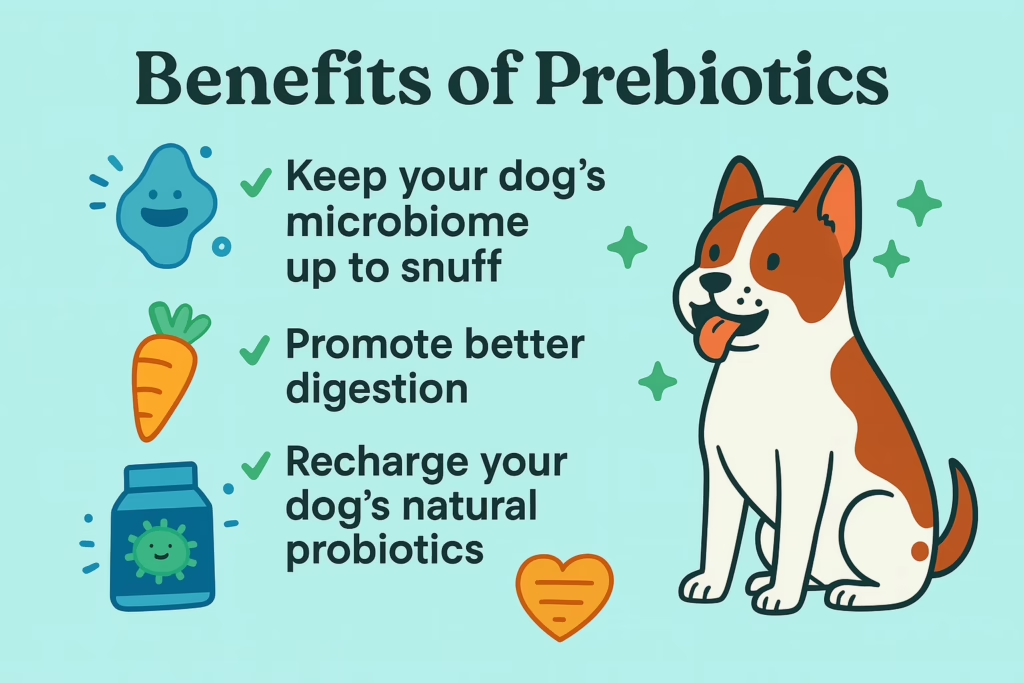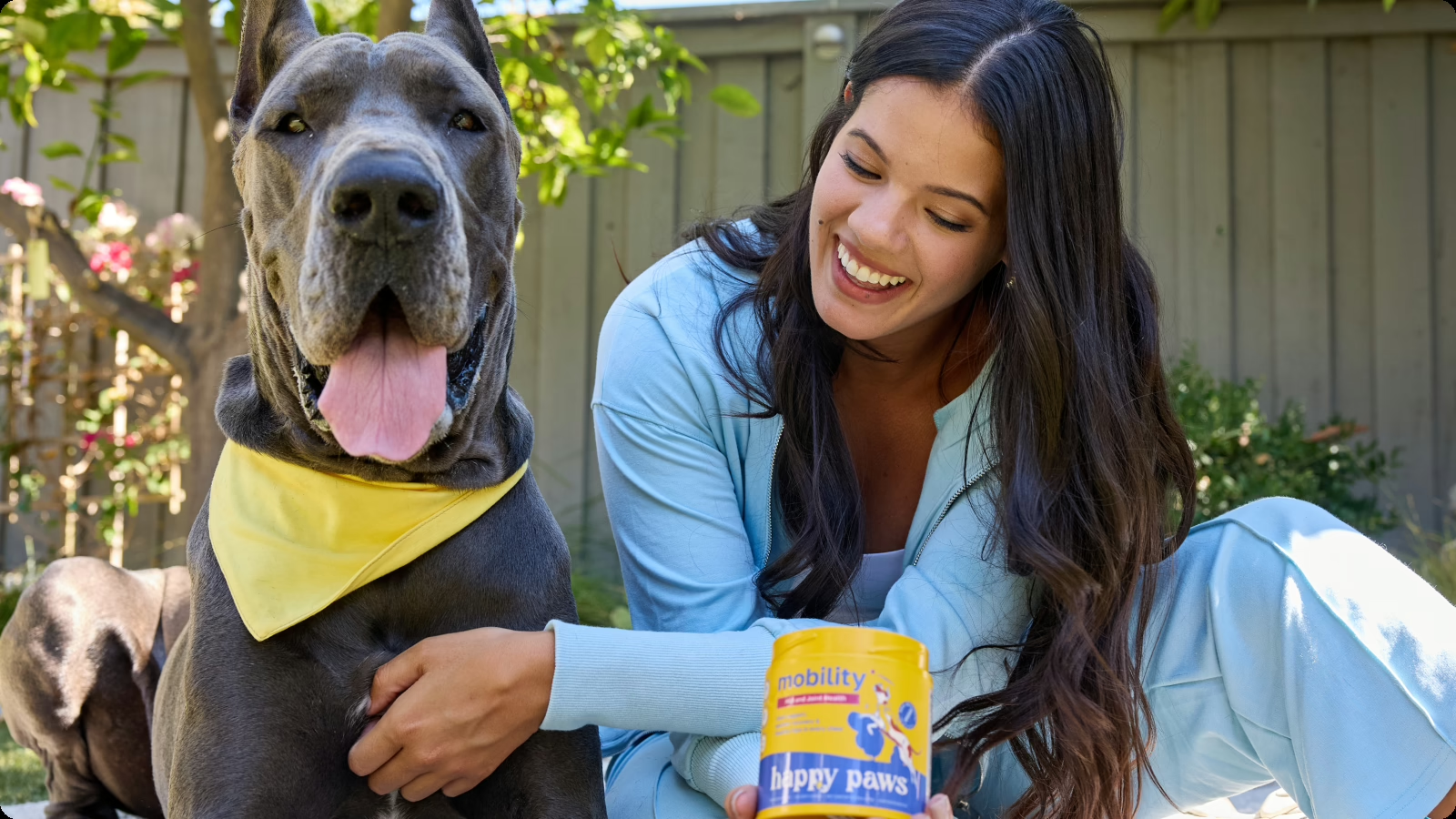Your dog’s digestive system is tough, rough, and robust, able to withstand just about anything your dog gives it. However, aging and exposure to new pathogens can weaken your dog’s digestive system, leading to issues like loose stool, bloating, gas, and skin or coat problems. That’s where nutrients like prebiotics and probiotics can help.
Here, we’ll explore the differences between prebiotics vs. probiotics, show you how they affect each other, and explain why they deserve a place in your dog’s diet. But, as with any canine concerns, it’s always important to consult your veterinarian before changing your dog’s diet. They’ll be able to evaluate your dog’s condition and recommend next steps. Vets are our best friends; they should be your dog’s, too!

What Is Your Dog’s Microbiome?
A dog’s gut microbiome significantly influences their overall health. Nutrients, vitamins, and minerals consumed by your dog are processed in the gut before reaching vital systems like the brain and immune system. When their gut microbiome is working in tip-top shape, your dog’s able to absorb all the necessary nutrients for proper nose-to-tail health. But when this system is lacking, your dog’s digestive health can decline.
Why Gut Health Matters
Inside your dog’s gut flora, trillions of microorganisms work around the clock to filter nutrients out of food and pass them off to other systems. These microorganisms are what’s known as probiotics: a healthy type of bacteria. They also serve as the first line of defense against viruses, harmful bacteria, and other potential toxins your dog might chomp down.
Your dog’s gut health is important for overall wellness. Other systems rely on your dog’s gut microbiome to hand over nutrients, vitamins, and minerals. When their gut microbiome isn’t up to snuff, your dog can experience a number of other issues outside of their GI tract.
What Affects Your Dog’s Gut Health?
A number of things can impact your dog’s gut health, positively and negatively.
Diet
Perhaps the most important factor affecting your dog’s gut health is their diet. Here, your dog gets all their necessary nutrients, vital vitamins, and much-needed minerals—at least, that’s the hope. Today, many, if not most, dogs are given a steady diet of dry dog food. While your dog might bend over backward to get the same meal they’ve had for years, it might not be anything to beg for. Many (not all) dry dog food brands overheat and overhydrate their products, sweating out all the healthy, happy nutrients from their formulas.
And if that’s all your dog eats, they may have a few too many nutrient gaps in their diet, leading to a gut microbiome that doesn’t have the support it needs to run smoothly. This is where supplementation may help fill in those gaps. We’ll discuss more on supplementation below.
Age
From their puppy stage to their golden years, your dog’s systems gradually slow down, losing that robust efficiency they had in their youth. (Hey, it happens to us, too.) This slowdown includes their microbiome. Over time, your dog’s microbiome slowly loses microorganisms, leaving their GI tract under-prepared for allergy season, viruses, and the occasional bout of diarrhea. Without a strong line of microorganism defense, your dog’s digestive health can decline, leading to a number of related health issues. From lowered immunity to digestive woes to skin and coat concerns, there are a number of general wellness issues that stem from poor gut health.
Genetics
While some breeds have stronger stomachs, others aren’t as lucky. Some breeds are known to have digestive issues caused by their genetics. Usually, these congenital conditions revolve around inflammation along the digestive tract. While certain supplementary diets can help your dog overcome these innate issues, it’s often challenging. So, if you believe your dog was born with gastrointestinal problems, it’s best to consult a vet about proper dietary steps.
Antibiotics
Veterinarians typically prescribe antibiotics to dogs to help neutralize harmful bacteria in your pup’s system. This prescription medicine works to fight off infections and help bring your dog back to their healthy baseline. But, in the process, these antibiotics also neutralize most of the healthy bacterial microorganisms in your dog’s system. This means that all those beneficial, naturally occurring probiotics first need to replenish before restoring your dog’s gut health, which can take some time. So, after giving them their last antibiotic, consult your veterinarian about adding a probiotic supplement to their diet, all to help get their gut health restored.
Occasional Viruses & Canine Bugs
Older pups aren’t the only ones who struggle with occasional digestive issues. Dogs of all ages can catch an occasional bug that disrupts their digestive health, leading to bouts of flatulence, loose stool, and constipation. Many different doggy viruses and bacteria can derail their gut health and weaken those trillion microorganisms. So, it’s always best to consult your veterinarian if you think your dog may have caught a bug.

What Are Prebiotics?
Prebiotics feed probiotics, and they’re having a moment. You can find prebiotic powders, sodas, and tablets, all to help your own gut health. But what about for your four-legged friend? Your dog’s diet might already be rich in prebiotics, helping to give their gut microbiome all the fuel it needs to function properly.
Sources of Prebiotics
Most prebiotics fall under the carbohydrate category. These complex carbohydrates exist as fibrous, starchy everyday foods like:
- Pumpkin
- Sweet potatoes
- Lentils
- Beans
- Flaxseed
- Peas
- Chicory root
Benefits of Prebiotics
When your dog has a diet rich in prebiotics, their gut microbiome has all the necessary fuel it needs to work efficiently. Prebiotics can help:
- Keep your dog’s microbiome up to snuff
- Promote better digestion
- Encourage better nutrient absorption
- Recharge your dog’s natural probiotics
- Provide extra dietary fiber
What Are Probiotics?
Probiotics are healthy bacteria that exist along your dog’s digestive tract. These bacteria are the ones responsible for absorbing nutrients and filtering out toxins. When your dog’s natural probiotics are in tip-top shape, their digestive system can identify viruses, block harmful bacteria, and transport vitamins and minerals to other systems, like your dog’s brain, nervous system, and immune system.
But, with age, poor diet, and the occasional round of antibiotics, the number of probiotics naturally existing in their gut flora slowly dwindles. Over time, your dog’s gut flora becomes understaffed. So, it can’t perform as effectively as it did during your dog’s puppyhood. This is how harmful bacteria can sneak in, nutrients go unabsorbed, and your dog’s digestive health can take a tumble.
Benefits of Supplementing Probiotics
One way pet parents like to bolster the number of healthy probiotics in their dog’s gut flora is by adding a probiotic supplement to their dog’s diet. Probiotic supplements for dogs offer healthy, active bacteria that can seamlessly slip into your dog’s microbiome and support digestion. Our Probiotic Dog Chews, along with all of our probiotic supplements, carry P-6 probiotics, which is a complex blend of essential, naturally occurring healthy bacteria for a dog’s gut health.
Prebiotics vs. Probiotics: Summary
Now that you know the difference between prebiotics and probiotics (prebiotics fuel probiotics), we need to let you in on a little industry secret. The best probiotics for dogs should be paired with prebiotic ingredients. This is commonly called a “synbiotic” supplement, which means it contains both prebiotics and probiotics. Luckily, our suite of probiotic supplements carries a combination of both!
3 Ways to Support a Healthy Gut Flora
Looking for ways to help fortify your dog’s gut health? Here are a few pet parents follow.
1. Routine Vet Visits
For all dogs, regardless of size, breed, or age, it’s always best to consult your veterinarian before adding a supplement or switching up their diet. Your vet will be able to decipher your dog’s unique condition and recommend a curated list of next steps that may include adding a probiotic supplement.
2. Focus on a Healthy Diet
The foundation of a dog’s health is their diet. A balanced, nutrient-rich diet is vital for puppies as they grow and for older dogs to maintain their vitality. While dry kibble is convenient, it may not provide all the necessary nutrition. Luckily, there are ways to add nutritional value to your dog’s kibble, thanks to high-quality dog supplements.
3. Supplement With Daily Dog Probiotic
From skin and coat health to fortified gut health, dog supplements can help cover the gaps in your dog’s daily diet. These supplements are made for daily use and use all-natural compounds to encourage proper function in key areas of your dog’s system. Most notably, a probiotic for dogs can help restore digestive health and promote a healthy microbiome, leaving your pup with a fortified number of gut-boosting bacteria.

Happy Paws Probiotic Dog Chews
Our Probiotic Dog Chews combine all that healthy, gut-boosting goodness into flavor-packed daily chews. These tasty supplements use a blend of P-6 probiotics to fortify and enrich your dog’s gastrointestinal tract. Plus, they offer antioxidant-rich nutrients to settle digestion, relieve bloating, and even promote fresher breath. And all that’s wrapped up in a vegan chicken flavor that’ll win over any picky eater.
How to Give Your Pet Probiotics
The best ways to give your dog our Happy Paws Probiotic Dog Chews is either as a kibble topper or as a standalone treat. Just place a serving of the chews on your dog’s breakfast or dinner, or call them over, ask ’em sit, and reward their good behavior with a tasty treat.
Daily Serving Guide Based on Dog Weight
Don’t know how much to give your dog? Here’s a helpful guide broken down by weight.
| Happy Paws Supplement | Under 10 lbs. | 10–30 lbs. | 31–60 lbs. | 61–90 lbs. | 90+ lbs. |
| Probiotic Dog Chews | 1 soft chew per day | 2 soft chews per day | 3 soft chews per day | 4 soft chews per day | 5 soft chews per day |
Parting Thoughts
Getting to know the differences between prebiotics and probiotics is very important for keeping your dog’s tummy happy and healthy. By finding the right balance of these prebiotics and probiotics, you can help support your pup’s gut and make sure they’re absorbing key nutrients from their food. A healthy gut means a happier dog overall, boosting their energy, immunity, and even their coat!
If you’re thinking about changing things up in their diet or adding dog supplements, don’t hesitate to consult with your vet. They’re always your best resource when it comes to your dog’s health and happiness!





